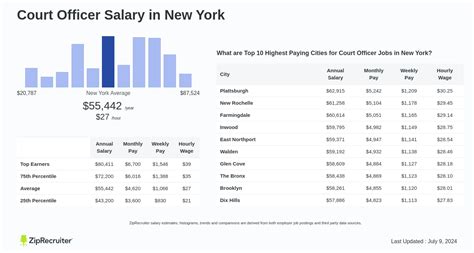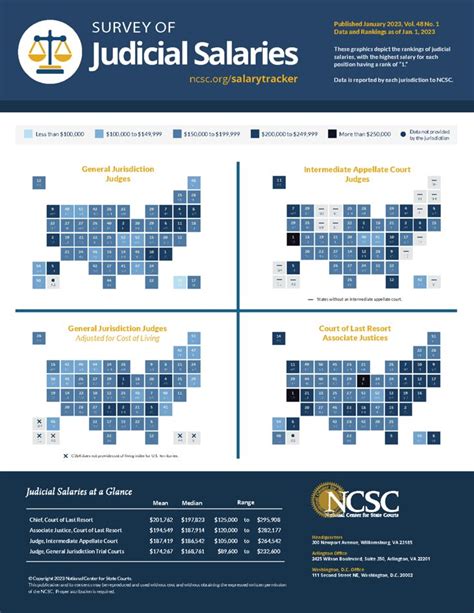A career as a state court officer offers a unique blend of public service, security, and involvement in the judicial process. For those drawn to a stable, respectable profession at the heart of our justice system, it's a compelling path. But what are the financial prospects?
A career as a state court officer provides a competitive and stable income. While entry-level positions offer a solid starting wage, experienced and specialized officers can earn a significant salary. Nationally, you can expect a salary ranging from $45,000 to over $75,000 annually, with several key factors influencing your specific earning potential.
This guide will provide a comprehensive breakdown of a state court officer's salary, the factors that shape it, and the future outlook for this essential profession.
What Does a State Court Officer Do?

Often referred to as bailiffs, state court officers are the guardians of the courtroom. They are uniformed law enforcement professionals responsible for ensuring the safety, security, and order of the court. Their role is critical to the smooth and fair administration of justice.
Key responsibilities include:
- Maintaining decorum and order within the courtroom.
- Providing security for judges, jurors, witnesses, and the general public.
- Screening individuals and bags for prohibited items upon entry to the courthouse.
- Taking custody of and escorting defendants and inmates to and from the courtroom.
- Announcing the entry and exit of the judge.
- Providing assistance to jurors and ensuring they are secure and free from outside influence.
In essence, a court officer is the visible presence of security and authority, ensuring that judicial proceedings can occur without threat or disruption.
Average State Court Officer Salary

Analyzing salary data for state court officers requires looking at a few authoritative sources, which categorize the role slightly differently.
The U.S. Bureau of Labor Statistics (BLS) groups this role under "Bailiffs." As of May 2023, the BLS reports the following national data:
- Median Annual Salary: $57,650
- Top 10% Earners: More than $82,330
- Bottom 10% Earners: Less than $35,930
Salary aggregators provide a more granular look. According to Salary.com (data updated in 2024), the median salary for a "Court Officer" in the United States is $59,201. Their data shows a typical range that breaks down as follows:
- Entry-Level (10th-25th Percentile): $46,477 - $52,430
- Mid-Career (50th Percentile): $59,201
- Senior/Experienced (75th-90th Percentile): $66,616 - $73,215
This data illustrates a clear path for financial growth within the profession as you gain skills and experience.
Key Factors That Influence Salary

Your salary as a state court officer isn't a single number; it's a range influenced by several critical factors. Understanding these can help you maximize your earning potential throughout your career.
### Geographic Location
Where you work is one of the most significant determinants of your salary. This is driven by state and local government budgets and the regional cost of living. States with a higher cost of living and larger, more complex court systems tend to offer higher pay.
According to BLS data, the top-paying states for bailiffs are:
1. California: $80,590 (annual mean wage)
2. New York: $78,560
3. Washington: $73,780
4. Massachusetts: $73,080
5. New Jersey: $70,880
Conversely, states with lower costs of living may offer salaries closer to the lower end of the national average. Working in a major metropolitan area will almost always yield a higher salary than a position in a rural county within the same state.
### Years of Experience
Experience is directly rewarded in this field. As with most government and law enforcement positions, court officer roles are often structured with clear steps or grades for pay increases based on seniority and performance.
- Entry-Level (0-2 years): New officers who have completed academy training will start at the lower end of the pay scale, typically in the $45,000 to $52,000 range.
- Mid-Career (3-9 years): With several years of experience, officers become more proficient and may take on additional responsibilities. Their salaries often climb into the $55,000 to $65,000 range.
- Senior/Supervisory (10+ years): Officers with a decade or more of experience are highly valued. Those who advance to supervisory ranks like Sergeant or Lieutenant can see their salaries exceed $75,000 or more, especially in high-paying states.
### Court System and Jurisdiction
The type of court system you work for matters. While this article focuses on *state* court officers, it's helpful to understand the landscape.
- State Courts: These are the most common positions and are funded by state budgets. Salaries can vary widely between states, as shown in the location data.
- Federal Courts: Federal Court Security Officers, often contracted through the U.S. Marshals Service, may have a different and sometimes higher pay scale based on the federal government's pay grades.
- County and Municipal Courts: These positions are funded by local governments. Pay can be competitive with state-level jobs in large, wealthy counties but may be lower in smaller, rural jurisdictions with more limited budgets.
### Level of Education and Certifications
While a high school diploma or GED is often the minimum educational requirement, additional qualifications can give you a competitive edge for hiring and promotions.
- Education: An Associate's or Bachelor's degree in Criminal Justice, Criminology, Public Administration, or a related field can be highly advantageous. Some jurisdictions may offer a higher starting salary or educational stipend for candidates with a degree.
- Academy Training: All court officers must graduate from a training academy. This rigorous training covers state laws, defensive tactics, emergency response, and firearm proficiency. Successful completion is mandatory.
- Certifications: Many states require court officers to be certified peace officers, which involves ongoing training and recertification. Specialized certifications, such as in crisis intervention or advanced security screening, can enhance a candidate's profile for promotion.
### Area of Specialization and Rank
Career progression is a key driver of higher earnings. A standard court officer performs the core duties, but opportunities for specialization and promotion unlock higher pay bands.
- Supervisory Ranks: Promotions to ranks like Court Officer-Sergeant or Court Officer-Lieutenant come with significant salary increases and leadership responsibilities, such as managing shifts, training new recruits, and coordinating security for high-profile trials.
- Specialized Units: In larger court systems, officers may join specialized teams, such as a Special Response Team (SRT) for high-risk situations or units focused on dignitary protection or prisoner transport, which can come with pay differentials or increased overtime opportunities.
Job Outlook

The U.S. Bureau of Labor Statistics projects a 6% decline in employment for bailiffs from 2022 to 2032. It's important to view this statistic with context. The BLS often attributes such declines to state and local government budget constraints.
However, the need for security in public spaces, especially courthouses, is constant and non-negotiable. Therefore, job openings will continue to arise from the need to replace officers who retire or transition to other careers. The fundamental role of a court officer in the justice system is secure. Candidates with strong qualifications, particularly those with a degree or prior law enforcement/military experience, will have the best prospects.
Conclusion: Is a Career as a State Court Officer Right for You?

Choosing a career as a state court officer is a commitment to public safety and the integrity of the judicial process. The financial compensation is solid and reliable, with a clear path for growth that rewards experience, dedication, and leadership.
Key Takeaways:
- Solid Earning Potential: Expect a national median salary in the range of $57,000 to $60,000, with significant upward mobility.
- Location is Key: Your earnings will be heavily influenced by the state and region where you work.
- Experience Pays: Longevity and promotion are the primary drivers for reaching the highest salary bands.
- A Stable and Honorable Career: While BLS projections show a slight decline, the essential nature of the work ensures a consistent need for qualified professionals.
For those seeking a structured career with good benefits, a respectable salary, and the profound satisfaction of serving their community, becoming a state court officer is a stable and rewarding path.
